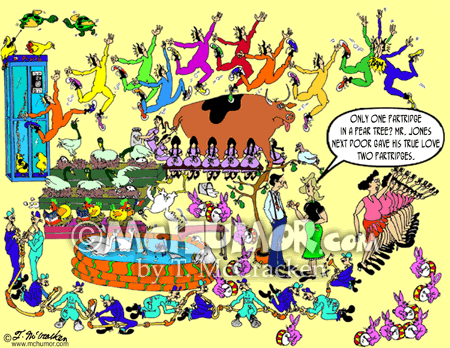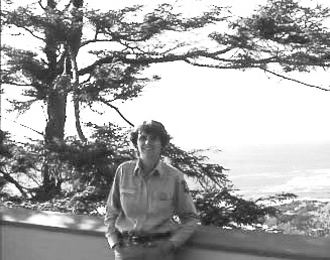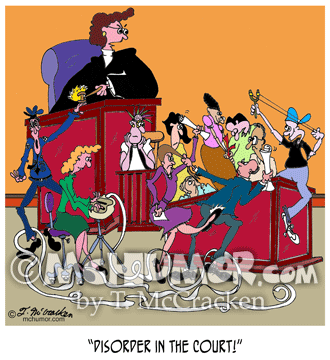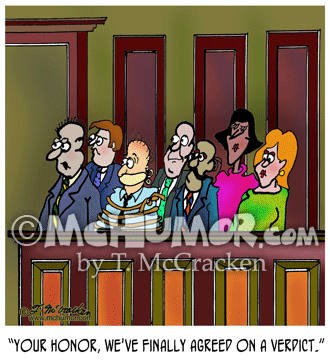My 1990 year-end letter where I describe the ordeal of being trapped for two weeks in a small room with eleven other jurors.
December 1990
Dear Friends and Family:
My life was touched by the war on drugs this year in that I was on a jury hearing a case about a cocaine distribution operation. Next time I’m called to jury duty I’ll do my best to avoid looking like someone who could be impartial, maybe even going so far as wearing a huge button that says, “Fry the Suckers.” Anything to avoid being locked up from 9:00 am until 5:00 pm for two weeks in a six-foot by sixteen-foot windowless room with eleven others. By the end of the ordeal, we jokingly referred to ourselves as the hostages of courtroom #3016
The defendant, a 17-year-old man, never actually touched the drugs in the case. In Washington D.C. it is now routine for teenagers to be tried as adults in drug and murder cases so kids under ten are usually the ones handling all the drugs and paraphernalia. The defendant was only accused of pocketing the drug money while a ten-year-old, referred to as “the juvenile”, worked for the defendant and held the cocaine.
During all the questioning no one raised the one question I was most curious about: where do drug dealers get tiny one-inch-square Ziploc bags and does Ziploc do niche advertising for them?
Closing arguments were presented on day five of the hostage crisis. On our first poll, nine of us thought the defendant was guilty.
A 10th juror said she thought court should be like the TV show, Night Court. She said she thought the man was guilty, but she couldn’t convict him unless there was “a high-quality videotape of the drug buy.” She didn’t think verbal testimony was sufficient. Another juror, a church deacon, asked: “Suppose you were raped and there was no other evidence but your word the man did it, what should happen then?”
“They should let him go,” she said.
The 11th juror, a middle-aged high school dropout who was a janitor and an alcoholic was confused by it all. I think the defense attorney’s strategy was to try to confuse everyone by bringing up things that were pretty irrelevant–did the undercover cop give the pre-arranged signal from the middle of the block or on the corner, were the drugs given to the arresting officer or a different officer, why was the date on the front page of the report June 17 and the date on the back of the report June 18–all things that were inconsistent but had nothing to do with the question of guilt or innocence. Still, we spent all of day eight of the hostage crises sorting through this minutia. By the end of day nine of the hostage crisis we all knew the police report by heart, including the grammar and spelling errors
On day ten of the hostage crisis we wrote the judge, “We’re deadlocked.” He told us it was too soon to give up.
On day eleven of the hostage crisis we wrote the judge, “We’re hung.” The judge replied: “Hang in there.”
On day eleven of the hostage crisis I started banging my head against the wall.
On day twelve of the hostage crisis a woman who was supposed to be enjoying her vacation in Bermuda wrote the judge: “It’s hopeless.”
“Don’t give up hope,” he said.
On day thirteen of the hostage crises, the 12th juror, the lone holdout, admitted she didn’t like cops, wasn’t going to help them one little bit, that there were already too many young black men in prison and she wasn’t going to send another away.
When she went to take a snooze in the corner another juror, a very distinguished-looking woman who had been the epitome of calm up until then, cracked. She was a psychiatrist and she’d been holding back too long she said. In her job she had to sit and listen to people all day and try to not tell them her real opinion. “Screw that!” she said. She said she’d also been holding back on using psychoanalytic techniques in the jury room. “Screw that too!” she said and started to psychoanalyze the woman. “If we don’t get out of here soon,” she said, “I’ll have another ten patients.” She’d already begun to analyze the rest of us. She’d told the foreman he suffered from a fear of silence, told a 23-year-old secretary she had a fear of authority figures due to the repressive atmosphere of her parochial school, and that I had a fear of commitment. Unfortunately, our hold out was beyond psychoanalytic help.
“Do you ever make mistakes?” the psychiatrist asked.
“No,” the 12th juror said.
“Do you ever change your mind?” the psychiatrist asked.
“I’ve never once changed my mind,” the 12th juror said.
We were all feeling the need for a little drug therapy and eyed the five tiny Ziploc bags of cocaine sitting in the middle of the table.
On day fourteen of the hostage crisis someone wrote the judge, “We’re hopelessly deadlocked.” The clerk looked at the note and said: “He’ll let you go this time. You have to use the words ‘hopelessly’ and ‘deadlocked’ in one sentence to get sprung.”
My God. It was like that Groucho Marx TV show where you had to say the magic word to have the duck fall down.
After that ordeal I was more than ready to go out west to fight fires, but this year I was offered a different position with the Forest Service: head naturalist at Siuslaw National Forest’s Cape Perpetua Interpretive Center on the central Oregon Coast. It was a job practically tailor-made for me because among other things I got to do a bit of oceanography, a bit of forestry, a bit of cartooning, and a bit of writing as part of my “assigned duties.”
I put together programs for people of all ages and backgrounds (e.g., everyone from kids to retired biology professors). Being an overgrown kid myself, I especially relished doing stuff for kids, especially stuff involving something gross.
This made sea stars (a.k.a starfish) my new favorite creature. Fun starfish factoid: after prying open a mussel with hydraulically powered legs they sort of upchuck their stomach into the shell, pour digestive juices over the meat, turn it all into a sort of bouillabaisse, slurp it up, and move on to another hapless victim.

Buy Starfish Cartoon 8663
Get it Printed on Stuff at Zazzle
Hope you and yours are doing well and you aren’t called to jury duty or pried open by a sea star.
T-
Cheap Law Cartoons. Something to amuse yourself with if you’re on a hung jury.

Buy Relationship Cartoon 5529
Get it Printed on Stuff at CafePress



